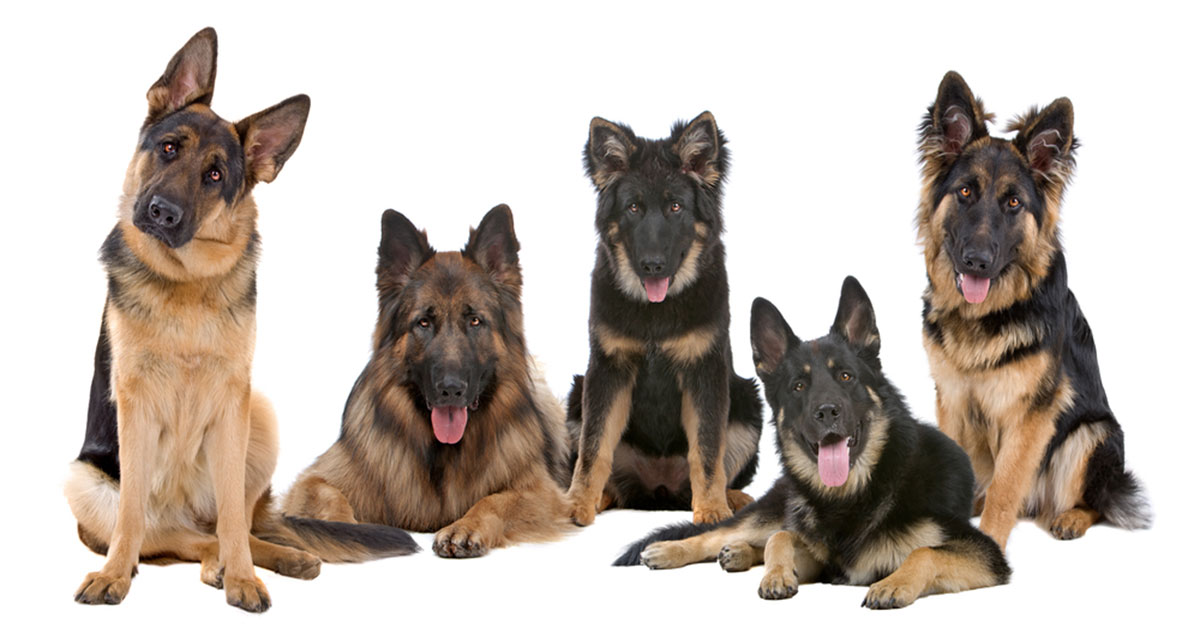German Shepherds are one of the most popular and beloved dog breeds worldwide. Known for their intelligence, loyalty, and versatility, these dogs make fantastic companions and working animals. As a responsible dog owner, understanding the life span of a German Shepherd is essential for providing them with the best care possible.
In this comprehensive guide, we will delve into various aspects of their life expectancy, factors affecting their longevity, and tips for promoting their overall well-being. So, let’s get started.
Table of Contents
Understanding the Life Span of a German Shepherd
German Shepherds typically have an average life span of 10 to 14 years. However, several factors can influence this range. Understanding these factors is crucial to ensuring your German Shepherd lives a long and healthy life.
Average Life Span of a German Shepherd
On average, German Shepherds live between 10 and 14 years. However, it’s important to remember that each dog is unique and may have their life expectancy. Factors such as genetics, environment, and overall health contribute to the variations we observe.
When considering gender differences, female German Shepherds tend to have a slightly longer life span compared to males. This disparity may be influenced by hormonal factors and genetic predispositions. It’s interesting to note these subtle variations, reminding us that each dog is a remarkable individual.
| Gender | Average Life Span |
| Female | 11-14 years |
| Male | 10-13 years |
Factors Affecting the Life Span of a German Shepherd
Various factors can affect the lifespan of a German Shepherd. These include:
- Genetics: The dog’s genetic background plays a significant role in determining their life expectancy. Responsible breeders strive to produce healthy puppies by carefully selecting breeding pairs and screening for hereditary conditions.
- Healthcare: Regular veterinary care, including vaccinations, parasite control, and preventive treatments, can contribute to a longer and healthier life for your German Shepherd.
- Nutrition: A balanced and nutritious diet tailored to the specific needs of your German Shepherd promotes overall well-being and helps prevent obesity and associated health problems.
- Exercise: Regular physical activity is essential for maintaining a healthy weight, strengthening muscles and joints, and preventing behavioral issues. German Shepherds are active dogs that require ample exercise to thrive.
- Environment: Providing a safe and enriched living environment is crucial. German Shepherds need mental stimulation and social interaction to prevent boredom and promote overall happiness and well-being.
- Spaying/Neutering: Sterilizing your German Shepherd can have a positive impact on their life span by reducing the risk of certain diseases, such as reproductive-related cancers.
Healthcare and Nutrition for Longevity
To ensure your German Shepherd enjoys a long and healthy life, prioritize their healthcare needs and nutrition. Regular veterinary check-ups, vaccinations, parasite prevention, and a balanced diet are essential elements in promoting longevity.
Veterinary care should include routine examinations, dental check-ups, and preventive treatments such as vaccinations, flea and tick control, and heartworm prevention. Your veterinarian can also provide advice on maintaining a healthy weight and detecting early signs of potential health issues.
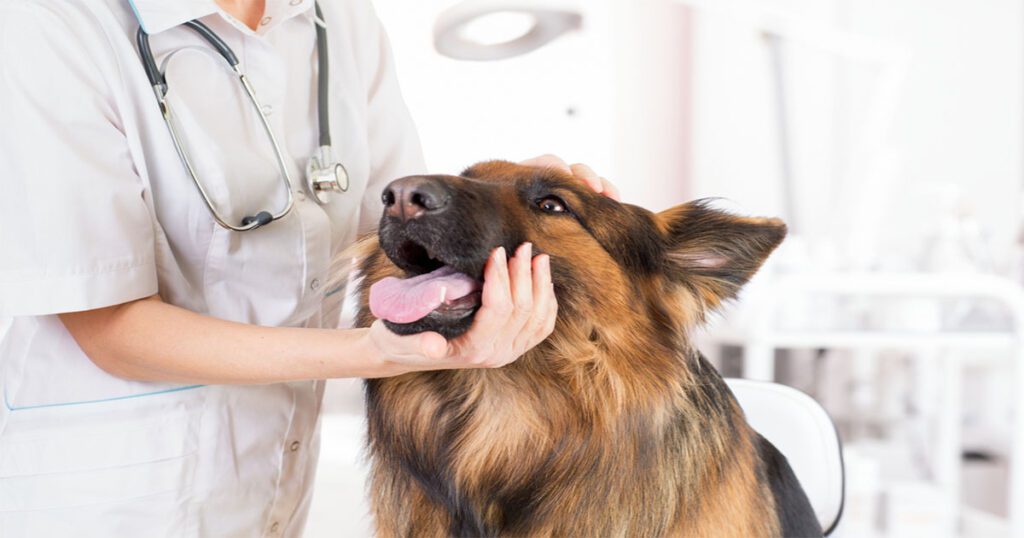
Healthcare and Nutrition
When it comes to nutrition, feed your German Shepherd high-quality dog food that meets their specific nutritional requirements. Look for formulas that include high levels of animal-based proteins, essential fatty acids, and a balanced mix of vitamins and minerals. Avoid overfeeding and monitor their weight to prevent obesity, which can shorten their life span and contribute to various health problems.
Exercise and Mental Stimulation
Regular exercise and mental stimulation are vital for the physical and mental well-being of German Shepherds. These dogs thrive in active environments that provide both physical and mental challenges. Consider the following tips to keep your German Shepherd physically and mentally stimulated:
- Take them on daily walks or engage in activities such as jogging, hiking, or playing fetch.
- Provide interactive toys and puzzles that encourage problem-solving and mental engagement.
- Enroll them in obedience training classes or engage in advanced training exercises.
- Engage in activities that tap into their instincts, such as scent work or agility training.
By incorporating regular exercise and mental stimulation into your German Shepherd’s routine, you can help prevent boredom and destructive behaviors, and promote their overall well-being.
Genetics and Breeding Considerations
The genetics of German Shepherds play a crucial role in life span of a German Shepherd and their overall health. When considering getting a German Shepherd, it is essential to choose a reputable breeder who prioritizes the health and longevity of their dogs. Reputable breeders perform health tests on their breeding dogs to ensure they are free from hereditary diseases commonly found in the breed.
Avoid purchasing puppies from backyard breeders or puppy mills, as these dogs are more likely to have health issues and shorter life spans. Responsible breeders prioritize the well-being of their dogs and strive to produce healthy and well-socialized puppies.
Common Health Issues in German Shepherds
While German Shepherds are generally a healthy breed, they are prone to certain health conditions. Some common health issues that can affect German Shepherds include:
- Hip Dysplasia: A hereditary condition where the hip joint doesn’t develop correctly, leading to joint instability and potential arthritis.
- Degenerative Myelopathy: A progressive neurological disease that affects the spinal cord and leads to hind limb weakness and paralysis.
- Gastric Dilatation-Volvulus (GDV): Also known as bloat, this condition involves stomach twisting, leading to potentially life-threatening complications.
- Exocrine Pancreatic Insufficiency (EPI): A disorder where the pancreas fails to produce sufficient digestive enzymes, leading to poor nutrient absorption and weight loss.
- Allergies: German Shepherds can develop allergies to various environmental triggers, such as pollen, dust mites, or certain food ingredients.
- Pan osteitis: A condition commonly known as “growing pains,” characterized by intermittent lameness and inflammation of the long bones.
It’s important to work closely with your veterinarian to monitor your German Shepherd’s health, be aware of potential symptoms, and take preventive measures to mitigate the risk of these conditions.
Grooming and Skin Care
Proper grooming and skin care are essential for maintaining the health and life span of a German Shepherd. Here are some grooming tips to keep in mind:
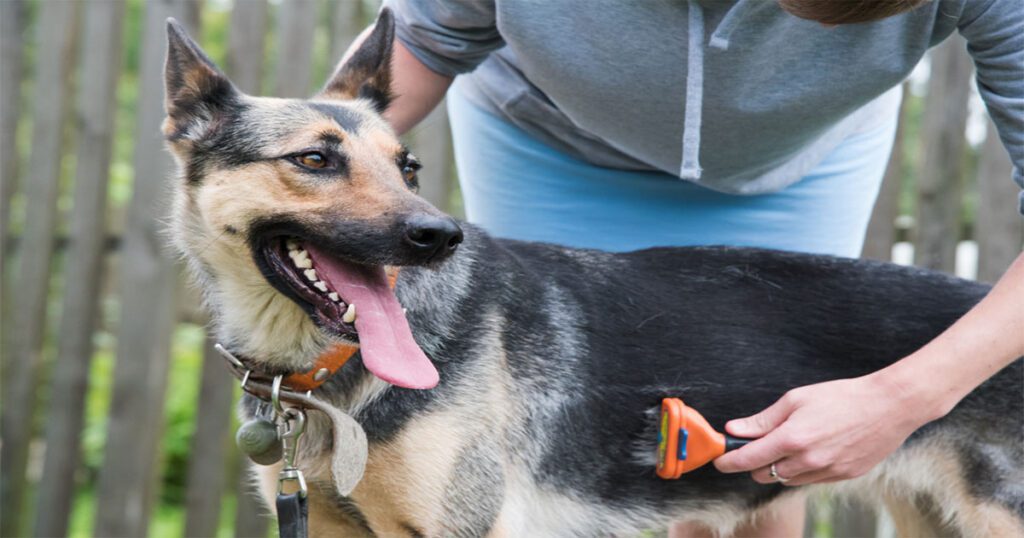
Grooming and Skin Care
- Brushing: German Shepherds have a dense double coat that requires regular brushing to remove loose hair and prevent matting. Use a slicker brush or an undercoat rake to effectively remove dead hair.
- Bathing: Bathe your German Shepherd as needed, typically every 6 to 8 weeks, or when they become dirty or smelly. Use a dog-specific shampoo that is gentle on their skin and coat.
- Nail Trimming: Regularly trim your German Shepherd’s nails to prevent overgrowth and discomfort. If you are not familiar with nail trimming, consult a professional groomer or your veterinarian for assistance.
- Ear Cleaning: Clean your German Shepherd’s ears regularly to prevent ear infections. Use a veterinarian-recommended ear cleaner and gently wipe the outer ear with a cotton ball or soft cloth.
Proper grooming not only keeps your German Shepherd looking their best but also helps maintain healthy skin and coat.
Providing a Safe and Enriched Environment to Ensure Good Life Span of a German Shepherd
Creating a safe and enriched environment is crucial for the well-being of your German Shepherd. Consider the following tips:
- Secure Fencing: Ensure your yard has secure fencing to prevent escapes and protect your German Shepherd from potential dangers outside. They can jump over the fence, has the ability to jump over 6/7 feet.
- Provide Shelter: Provide a comfortable and weather-appropriate shelter for your German Shepherd to retreat to when necessary.
- Avoid Extreme Temperatures: German Shepherds are sensitive to extreme temperatures. Provide shade and fresh water during hot weather and a warm, insulated area during cold weather.
- Mental Stimulation: Provide puzzle toys, treat-dispensing toys, and interactive games to keep your German Shepherd mentally engaged and prevent boredom.
- Safe Toys: Choose toys that are appropriate for your German Shepherd’s size and chewing habits. Avoid toys that can pose choking hazards or easily break apart.
Routine Veterinary Check-ups for Better Life Span of a German Shepherd
Regular veterinary check-ups are essential for monitoring your German Shepherd’s health and detecting potential issues early on. Schedule routine wellness examinations with your veterinarian to assess your dog’s overall health, administer vaccinations, and address any concerns you may have.
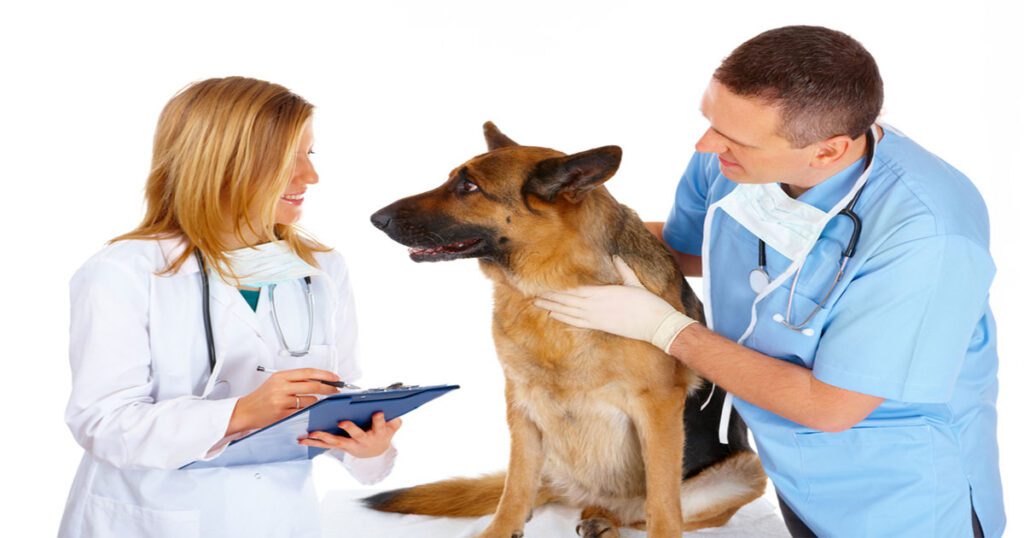
Routine Veterinary Check-ups
During these check-ups, your veterinarian will perform a thorough physical examination, check vital signs, and may recommend additional tests or screenings based on your dog’s age and health history. Routine blood work, fecal examinations, and heartworm tests are commonly conducted to detect any underlying health issues.
Your veterinarian can also provide advice on preventive care, nutrition, and behavior management tailored to your German Shepherd’s specific needs.
Caring for Senior German Shepherds
As German Shepherds age, their care needs change. Senior German Shepherds require additional attention and care to ensure they age gracefully and comfortably. Here are some important considerations when caring for senior German Shepherds:
- Regular Veterinary Check-ups: Schedule more frequent veterinary check-ups to monitor their health, address age-related concerns, and adjust their healthcare plan accordingly.
- Dietary Adjustments: Senior German Shepherds may require a diet formulated specifically for their age and health condition. Consult your veterinarian for guidance on appropriate nutrition and portion sizes.
- Joint Support: Provide joint supplements, such as glucosamine and chondroitin, to support your senior German Shepherd’s joint health and mobility.
- Exercise and Mental Stimulation: Adjust the intensity and duration of exercise to suit your senior German Shepherd’s capabilities. Continue providing mental stimulation through interactive toys and puzzles.
- Comfortable Environment: Create a comfortable and easily accessible living environment for your senior German Shepherd. Consider providing orthopedic beds and ramps to help them navigate stairs or elevated surfaces.
Feeding Guidelines for German Shepherds
Proper nutrition is vital for the health and longevity of your German Shepherd. Follow these feeding guidelines to ensure your dog receives the appropriate nutrients:
Choose High-Quality Dog Food
Opt. for premium dog food brands that are specifically formulated for German Shepherds or large-breed dogs. Look for formulas that contain high-quality proteins, healthy fats, and a balance of vitamins and minerals.
Consider Life Stage
German Shepherds have different nutritional requirements throughout their life stages. Choose food formulated for puppies, adults, or seniors, depending on your dog’s age.
Portion Control
Follow the feeding guidelines provided by the dog food manufacturer based on your German Shepherd’s weight and age. Adjust the portion sizes as needed to maintain a healthy weight.
Avoid Overfeeding
German Shepherds are prone to weight gain, which can lead to health issues. Be mindful of portion sizes and avoid overfeeding or free-feeding. Give training to loose over weight if needed.
Monitor Body Condition
Regularly assess your German Shepherd’s body condition by feeling their ribs. Ideally, you should be able to feel the ribs without excess fat covering them.
Hydration
Provide fresh and clean water at all times to keep your German Shepherd hydrated.
These all guidelines are essential for a better life span of a German Shepherd.
Consult with your veterinarian for specific feeding recommendations based on your German Shepherd’s individual needs and any health concerns.
Socialization and Exercise for Puppies
Proper socialization and exercise are critical for the development of German Shepherd puppies. Here’s how you can help your puppy grow into a well-rounded and happy adult:
Positive Socialization
Expose your German Shepherd puppy to a variety of people, animals, and environments from a young age. Enroll them in puppy socialization classes to help them become comfortable with new experiences and build positive associations.
Play and Exercise
Puppies have boundless energy and require frequent play and exercise to expend it. Engage in age-appropriate activities that promote physical and mental stimulation, such as short walks, interactive play sessions, and puzzle toys.
Basic Obedience Training
Start basic obedience training early to establish good manners and build a foundation for further training. Teach commands like sit, stay, and come using positive reinforcement techniques.
Handling and Grooming
Introduce your German Shepherd puppy to gentle handling, including touching their paws, ears, and teeth. This helps them become comfortable with grooming routines and veterinary examinations.
By providing positive social experiences and age-appropriate exercise, you can help your German Shepherd puppy grow into a well-socialized and balanced adult.
Creating a Balanced Diet for Your Pet
A balanced diet is essential for promoting the overall health and well-being of your German Shepherd. Consider the following tips to create a nutritious and balanced diet:
- High-Quality Protein: Choose a dog food that contains high-quality protein sources, such as chicken, beef, or fish. Protein is crucial for muscle development and repair.
- Healthy Fats: Include healthy fats, such as fish oil or flaxseed oil, in your German Shepherd’s diet. These fats support skin and coat health and provide essential fatty acids.
- Carbohydrates: Opt for complex carbohydrates like sweet potatoes or brown rice, which provide sustained energy and fiber.
- Fruits and Vegetables: Supplement your German Shepherd’s diet with fruits and vegetables, such as carrots, blueberries, or green beans. These provide essential vitamins and minerals.
- Avoid Harmful Ingredients: Avoid dog food that contains artificial preservatives, flavors, or colors. Also, steer clear of foods with excessive fillers or by-products.
- Consult with Your Veterinarian: If you have specific dietary concerns or your German Shepherd has unique nutritional needs, consult your veterinarian for personalized recommendations.
Remember to introduce any dietary changes gradually to prevent digestive upset. Monitor your German Shepherd’s weight and overall condition to ensure they are thriving on their diet.
Choosing a Reputable Breeder
Choosing a reputable breeder is paramount when adding a German Shepherd to your family. Responsible breeder prioritizes the health and well-being of their dogs and follows ethical breeding practices. Consider the following when selecting a breeder:
Health Testing
Reputable breeders conduct health tests on their breeding dogs to ensure they are free from hereditary diseases common in German Shepherds. Request to see health clearances for both parents.
Breeding Standards
Look for breeders who adhere to breed standards set by recognized kennel clubs. They should breed for the betterment of the breed rather than solely for profit.
Socialization and Care
A reputable breeder ensures proper socialization and care for their puppies. They provide a clean and stimulating environment, expose the puppies to various stimuli, and start basic training.
References and Reviews
Ask for references from previous puppy buyers or check online reviews and testimonials. This can provide insights into the breeder’s reputation and the experiences of previous puppy owners.
Interview the Breeder
Ask the breeder questions about their breeding program, the care they provide to their dogs and puppies, and their commitment to their dogs’ well-being throughout their lives.
Remember that purchasing a puppy from a reputable breeder may require patience, as litter may not always be available. However, the wait is worth it to ensure you bring home a healthy and well-cared-for German Shepherd.
Protecting Your German Shepherd’s Joints
German Shepherds are prone to joint issues, such as hip dysplasia and arthritis. To protect your German Shepherd’s joints and promote their long-term mobility, consider the following:
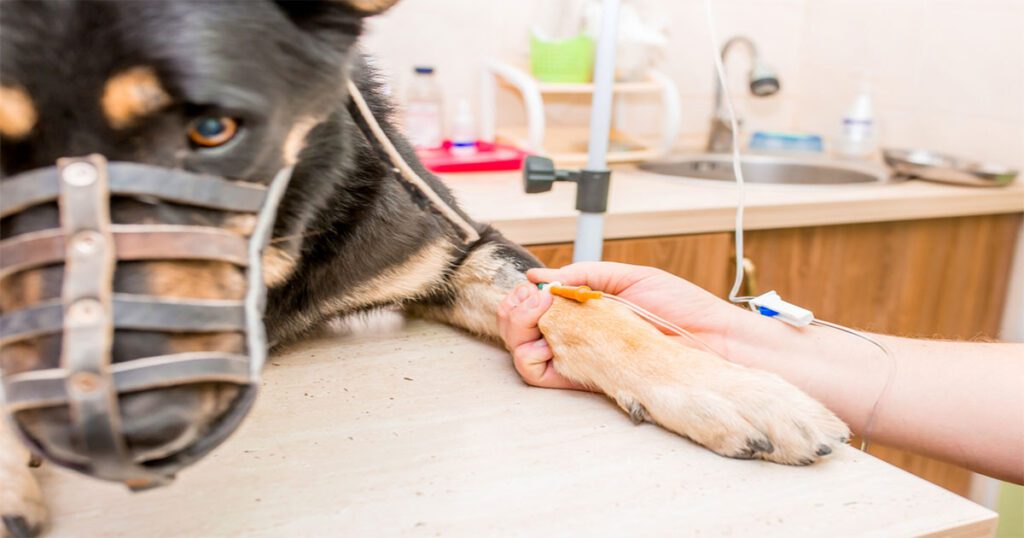
Protecting Your German Shepherd’s Joints
- Maintain a Healthy Weight: Excess weight places additional stress on your dog’s joints. Ensure your German Shepherd maintains a healthy weight through a balanced diet and regular exercise.
- Low-Impact Exercise: Engage in low-impact exercises, such as swimming or walking on soft surfaces, to reduce the strain on your German Shepherd’s joints.
- Joint Supplements: Consult your veterinarian about joint supplements, such as glucosamine and chondroitin, which can support joint health and reduce the risk of degenerative joint diseases.
- Orthopedic Bedding: Provide your German Shepherd with a comfortable orthopedic bed that offers support and cushioning for their joints.
- Avoid Excessive Jumping: Discourage excessive jumping, especially from heights, as it can contribute to joint injuries.
Preventing Obesity in German Shepherds
Obesity is a common health concern in German Shepherds and can lead to various health issues and a shortened life span. To prevent obesity in your German Shepherd, follow these tips:
- Portion Control: Measure your German Shepherd’s food portions according to the recommended guidelines provided by the dog food manufacturer. Avoid overfeeding or free-feeding.
- Avoid Table Scraps: Resist the temptation to feed your German Shepherd table scraps or human food, as it can contribute to weight gain and nutritional imbalances.
- Treats in Moderation: Limit the number and size of treats you offer your German Shepherd. Choose healthy, low-calorie treats or use their regular kibble as treats during training sessions.
- Regular Exercise: Engage your German Shepherd in regular exercise to burn calories and maintain a healthy weight. Adjust the intensity and duration of exercise based on their fitness level.
- Monitor Body Condition: Regularly assess your German Shepherd’s body condition by feeling their ribs and waist. Adjust their food intake and exercise routine if necessary.
Frequently Asked Questions
Q: How long do German Shepherds typically live?
Ans: German Shepherds have an average life span of 9 to 13 years. With proper care and a healthy lifestyle, some German Shepherds can live even longer.
Q: What are the common health issues in German Shepherds?
Ans: Some common health issues in German Shepherds include hip dysplasia, degenerative myelopathy, gastric dilatation-volvulus (bloat), exocrine pancreatic insufficiency (EPI), allergies, and panosteitis.
Q: How often should I take my German Shepherd to the veterinarian?
Ans: Regular veterinary check-ups are important for your German Shepherd’s health. Generally, annual wellness exams are recommended, but as your dog ages, more frequent visits may be necessary.
Q: Do German Shepherds require a lot of exercise?
Ans: Yes, German Shepherds are an active breed that requires regular exercise. Aim for at least 30 minutes to 1 hour of exercise daily, including walks, playtime, and mental stimulation.
Q: Are German Shepherds good with children?
Ans: German Shepherds can be excellent family dogs and are generally good with children when properly socialized and trained. Supervision is always recommended when dogs and children interact.
Q: How can I groom my German Shepherd’s coat?
Ans: German Shepherds have a dense double coat that requires regular brushing to remove loose hair and prevent matting. Use a slicker brush or an undercoat rake to groom their coat.
Conclusion
Understanding the life span of a German Shepherd and the factors that influence their longevity is crucial for providing them with the best care possible. By prioritizing their healthcare, nutrition, exercise, socialization, and overall well-being, you can help ensure that your German Shepherd lives a long, healthy, and fulfilling life.
Remember to consult with your veterinarian for personalized advice and recommendations based on your German Shepherd’s individual needs. Cherish the time you have with your furry friend and create a lifetime of cherished memories together. Good luck!

I’m David, an expert contributor and writer, with two furry friends of my own, I know the challenges of raising and caring for dogs. From training to nutrition and health, my goal is to provide valuable insights and advice to help create strong bonds and happy, healthy lives. Find me in Twitter.


